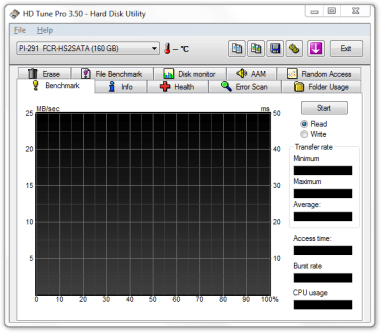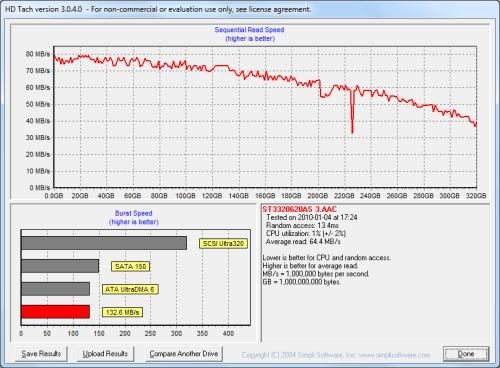- Qualcomm Launches Snapdragon 4 Gen 2 Mobile Platform
- AMD Launches Ryzen PRO 7000 Series Mobile & Desktop Platform
- Intel Launches Sleek Single-Slot Arc Pro A60 Workstation Graphics Card
- NVIDIA Announces Latest Ada Lovelace Additions: GeForce RTX 4060 Ti & RTX 4060
- Maxon Redshift With AMD Radeon GPU Rendering Support Now Available
Western Digital SiliconEdge Blue 256GB
The SSD market is littered with competitors, but up to now, few companies behind mechanical storage have entered the arena. Last month though, Western Digital scratched its name off the list, with the help of its SiliconEdge Blue models. We’re taking a look at the 256GB variant here, so let’s see how it fares against the competition!
Page 6 – Synthetic: HD Tune Pro 3.5, HD Tach RW3
HD Tune Pro 3.5
HD Tune has long been one of our favorite storage benchmarks, thanks in part to its ease-of-use, and its ability to deliver consistent results (which is obviously important). Since we are using HD Tune on storage devices that also house our OS, we’re unable to test the write performance, so here, we stick to both Read and Access Times.
![]()
![]()
For the read tests the SiliconEdge does well in the random and 1MB tests, but once the file sizes decrease other drives like the Vertex Turbo start to deliver higher performance. Still, any SSD in the bunch is better than a hard disk drive, which manages an eye-watering 0.036MB/s for 512B file sizes, or in other words 36KB/s versus the3.5MB/s of the SiliconEdge Blue.
Yet again we show access times as these are the hallmark of solid-state drives, and I can’t underscore this point enough. The dirty state of the G1 leaves it with a particularly high result here, but even the G1 and other SSDs all put in results an order of magnitude better than the platter-based drive with small file reads.
HD Tach RW/3
HD Tach is a program similar to HD Tune, and although it hasn’t been updated in a few years, it’s still decent for testing SSDs. It offers a different method for calculating burst rates, as well as offering access time measurements below 0.1ms, which is unfortunately the limit for HD Tune. With a massive new program rewrite in the works, we look forward to seeing what the upcoming new version can do.
![]()
![]()
HD Tach is another program designed to measure platter-based drives (hence the downward curve in the image) but is capable of measuring access times below 0.1ms if the platform is capable of it. In these tests the Western Digital SSD delivers solid performance close to or ahead of the other drives. The 13ms access latency is typical for a standard mechanical drive, but even a VelociRaptor would only decrease the latency to 7ms, a far cry from 0.1ms.
Support our efforts! With ad revenue at an all-time low for written websites, we're relying more than ever on reader support to help us continue putting so much effort into this type of content. You can support us by becoming a Patron, or by using our Amazon shopping affiliate links listed through our articles. Thanks for your support!






